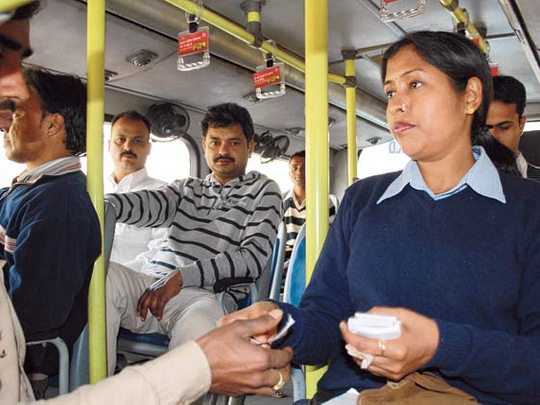
New Delhi: Women may find the city unsafe, but they are not sitting back and taking things lying down.
They are defying norms and changing job profiles by taking up tasks that require interaction with men. Some have joined the Delhi Transport Corporation (DTC) as bus conductors.
DTC recently hired 130 women to work as bus conductors. Short of staff, it had issued an advertisement for the vacancies.
A number of people applied, including many women. But unlike previous times when few women applied and were never considered and recruited, the mindset of the city's authorities changed this time.
After completing a first-aid course and passing written tests, training was not difficult for eligible women. Interviewed without any gender bias, they were hired on a contract, which is renewed every 89 days.
Officials felt women were more sincere and performed better without getting into unnecessary arguments and hassles with passengers. The women conductors proved them correct.
Rude encounters
Suman Lata, 32, often encounters men who refuse to vacate seats reserved for women and others who have rude behaviour.
She said: "Earlier I used to get nervous, but now I know how to tackle them. The job has given me self-confidence and I can put them in their place. At certain times, I consider it best to ignore them."
She recalls her initial days on the job when men would think of her as one of the passengers and would stare at her quizzically when she collected the bus fare.
Giving credit to her husband for her fresh approach to life, she said: "I was very shy and reticent, but he instilled in me that it was necessary for women to be bold. He maintains that instead of being home-bound, cooking and looking after children, women should come out in the open and become self-reliant."
Ironically, Lata never travelled by bus on her own.
"I never felt safe. But now I am confident," she says.
Assuaging safety concerns, women conductors, all of whom are in the 25 to 35 age group, are put on 7.30am to 3.30pm shifts. This allows them time to look after their family and home.
Earning Rs5,000 (Dh398.59) per month, they find support from kin in supplementing the family income. The awareness has caught on and more women are looking forward to applying for jobs with DTC in the next batch of vacancies.
Less tortuous
Raj Rani, a commuter, said: "I would love to join the fleet. Commuting has become less tortuous on the routes that have women conductors and I feel very comfortable boarding a bus. It's difficult to explain the immeasurable damage that everyday harassment had done to my self-esteem, but now I travel fearlessly."
She claimed to have neither faced sexual harassment, nor been witness to any such incident in buses that have women conductors.
"Obviously, men would feel ashamed if caught by a woman," she adds.
The incident was fresh in her mind when the Delhi High Court upheld the DTCs order terminating the services of a driver and a conductor in a sexual harassment case.
The DTC had challenged a labour court order that cancelled the termination of the two. But the High Court found that they had not done anything to prevent the incident and rather mocked the victim.
"If people are punished severely for eve-teasing, only then will harassment of women stop," Rani said.
Gender equality is resulting in the city women proving their mettle and taking charge in other departments as well.
Sunita Chauhan, is manager at DTC's Tehkhand Depot. She joined the service 17 years ago as management trainee.
"Initially, I felt awkward joining a male-dominated profession, but over the years have earned a lot of respect from the staff as well as the public."












